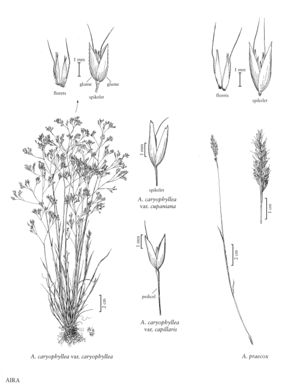Difference between revisions of "Aira caryophyllea var. caryophyllea"
FNA>Volume Importer |
imported>Volume Importer |
||
| (8 intermediate revisions by 2 users not shown) | |||
| Line 1: | Line 1: | ||
{{Treatment/ID | {{Treatment/ID | ||
|accepted_name=Aira caryophyllea var. caryophyllea | |accepted_name=Aira caryophyllea var. caryophyllea | ||
| − | |accepted_authority= | + | |accepted_authority= |
|publications= | |publications= | ||
|common_names=Silver hairgrass | |common_names=Silver hairgrass | ||
| Line 16: | Line 16: | ||
-->{{Treatment/Body | -->{{Treatment/Body | ||
| − | |distribution=Wash.;Del.;D.C;Conn.;Mass.;N.Y.;Pacific Islands (Hawaii);Fla.;Wyo.;N.H.;N.J.;Tex.;La.;B.C.;N.S.;Yukon;Tenn.;N.C.;S.C.;Pa.;Calif.;Va.;Alaska;Ala.;Miss.;Ark.;Vt.;Ill.;Ga.;Ind.;Okla.;Idaho;Md.;Ohio;Mo.;Oreg. | + | |distribution=Wash.;Del.;D.C.;Conn.;Mass.;N.Y.;Pacific Islands (Hawaii);Fla.;Wyo.;N.H.;N.J.;Tex.;La.;B.C.;N.S.;Yukon;Tenn.;N.C.;S.C.;Pa.;Calif.;Va.;Alaska;Ala.;Miss.;Ark.;Vt.;Ill.;Ga.;Ind.;Okla.;Idaho;Md.;Ohio;Mo.;Oreg. |
| − | |discussion=<p>Aira caryophyllea var. caryophyllea is native to the Mediterranean region. It usually grows in dry, sandy to rocky soil and on rock outcrops, in open and disturbed sites in woods, grassy flats, pastures, paths, and roadsides; it is occasionally found in damp ground at swamp or lagoon margins.</p> | + | |discussion=<p><i>Aira caryophyllea </i>var.<i> caryophyllea</i> is native to the Mediterranean region. It usually grows in dry, sandy to rocky soil and on rock outcrops, in open and disturbed sites in woods, grassy flats, pastures, paths, and roadsides; it is occasionally found in damp ground at swamp or lagoon margins.</p> |
|tables= | |tables= | ||
|references= | |references= | ||
| Line 26: | Line 26: | ||
-->{{#Taxon: | -->{{#Taxon: | ||
name=Aira caryophyllea var. caryophyllea | name=Aira caryophyllea var. caryophyllea | ||
| − | + | |authority= | |
| − | |authority= | ||
|rank=variety | |rank=variety | ||
|parent rank=species | |parent rank=species | ||
| Line 33: | Line 32: | ||
|basionyms= | |basionyms= | ||
|family=Poaceae | |family=Poaceae | ||
| − | |distribution=Wash.;Del.;D.C;Conn.;Mass.;N.Y.;Pacific Islands (Hawaii);Fla.;Wyo.;N.H.;N.J.;Tex.;La.;B.C.;N.S.;Yukon;Tenn.;N.C.;S.C.;Pa.;Calif.;Va.;Alaska;Ala.;Miss.;Ark.;Vt.;Ill.;Ga.;Ind.;Okla.;Idaho;Md.;Ohio;Mo.;Oreg. | + | |illustrator=Linda Ann Vorobik;Hana Pazdírková |
| + | |illustration copyright=Utah State University | ||
| + | |distribution=Wash.;Del.;D.C.;Conn.;Mass.;N.Y.;Pacific Islands (Hawaii);Fla.;Wyo.;N.H.;N.J.;Tex.;La.;B.C.;N.S.;Yukon;Tenn.;N.C.;S.C.;Pa.;Calif.;Va.;Alaska;Ala.;Miss.;Ark.;Vt.;Ill.;Ga.;Ind.;Okla.;Idaho;Md.;Ohio;Mo.;Oreg. | ||
|reference=None | |reference=None | ||
|publication title= | |publication title= | ||
|publication year= | |publication year= | ||
|special status= | |special status= | ||
| − | |source xml=https:// | + | |source xml=https://bitbucket.org/aafc-mbb/fna-data-curation/src/200273ad09963decb8fc72550212de541d86569d/coarse_grained_fna_xml/V24/V24_876.xml |
|subfamily=Poaceae subfam. Pooideae | |subfamily=Poaceae subfam. Pooideae | ||
|tribe=Poaceae tribe Poeae | |tribe=Poaceae tribe Poeae | ||
Latest revision as of 16:25, 11 May 2021
Pedicels 0.9-7 mm, usually 1-2 times as long as the spikelets, gradually thickening to the apices. Spikelets 2-3.3(3.5) mm, usually appressed to the secondary branches, silvery-green to stramineous; rachillas not prolonged. Glumes 2-3.3(3.5) mm, subequal, 1-veined or the upper glumes with 2 lateral veins, these sometimes obscure and usually less than 1/2 the length of the glumes, acute; lower lemmas 2-2.4 mm, apices bifid, teeth 0.2-0.4 mm, awned, awns 2.4-3.5 mm, geniculate; lower paleas 1.5-1.7 mm; upper lemmas 2-2.6 mm, apices bifid, teeth 0.2-0.3 mm, awned, awns 2.5-3.9 mm; upper paleas 1.4-1.7 mm; anthers 0.2-0.5 mm, yellow to orange. Caryopses 1.4-1.5 mm long, 0.4-0.5 mm wide, glabrous.
Distribution
Wash., Del., D.C., Conn., Mass., N.Y., Pacific Islands (Hawaii), Fla., Wyo., N.H., N.J., Tex., La., B.C., N.S., Yukon, Tenn., N.C., S.C., Pa., Calif., Va., Alaska, Ala., Miss., Ark., Vt., Ill., Ga., Ind., Okla., Idaho, Md., Ohio, Mo., Oreg.
Discussion
Aira caryophyllea var. caryophyllea is native to the Mediterranean region. It usually grows in dry, sandy to rocky soil and on rock outcrops, in open and disturbed sites in woods, grassy flats, pastures, paths, and roadsides; it is occasionally found in damp ground at swamp or lagoon margins.
Selected References
None.
